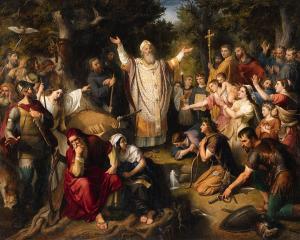 The world is constantly changing, and effective leadership requires adaptability, yet adaptation without cultural integrity leads to fragmentation.
The world is constantly changing, and effective leadership requires adaptability, yet adaptation without cultural integrity leads to fragmentation.
Today, we celebrate the feast of St. Boniface, a towering figure in Church history known for his martyrdom and his missionary zeal. On the eve of Pentecost in 754, Boniface and his companions were killed by marauders as they prepared for a confirmation ceremony. Yet, his legacy extends far beyond his martyrdom—he was instrumental in reviving the Church in present-day France and bringing the faith into Germany, laying the foundation for Christianity in Western Europe.
Building the Right Culture First
Boniface, born Winfrid in England, understood that evangelization was not merely about preaching—it was about building a culture. He spent years cultivating relationships and fostering a deep love for the Gospel among the Anglo-Saxons. His ability to cast a compelling vision for the Kingdom of God made people want to be part of his mission.
It is often said that, “Culture eats strategy for breakfast.” Boniface embodied this principle by ensuring that the people he evangelized were not just converts but culture bearers. When he embarked on his first mission in his 40s, he brought with him trusted Anglo-Saxon leaders who shared his vision. These men became monastic leaders and bishops, ensuring that the faith was not only established but sustained.
Adapting the Methods and Vessels

Boniface’s leadership was both strategic and adaptable. He understood that while the heart of the mission remained unchanged, the approach needed to be accessible. His decision to change his name from Winfrid to Boniface mirrors St. Paul’s transformation from Saul to Paul (Acts 13:9), signifying a shift in mission focus. He held the mission above his identity. We need to conform ourselves to be accessible, to be as familiar as we can with the people that we’re trying to reach.
He didn’t cling to his identity – he focused on his mission. He cared for those who he wanted to see freed from the darkness and brought into the light of Jesus. There’s a quote from my friend Rich Sheridan that I am reminded of, he states:
“If we, as leaders, can inspire those around us with a clear vision of serving others, working with pride, and delivering outstanding results to the world, most other things become far less important” (Chief Joy Officer)
A Call to Action
Boniface’s life teaches us that true leadership requires a compelling vision that remains the dame but the freedom to be agile and adaptabile.
As Don Miller so often says,
“People want to be part of something bigger than themselves.”
Boniface understood this deeply—he invited others into a mission that was compelling, transformative, and eternal.
As leaders, our greatest challenge is not just setting a strategy but building a culture that sustains it. St. Boniface understood this deeply—he didn’t just establish structures, he formed leaders who carried the heart of the mission forward. The world is constantly changing, and effective leadership requires adaptability, yet adaptation without cultural integrity leads to fragmentation.
As Saint Paul writes in 1 Corinthians 3:10-11,
“By the grace God has given me, I laid a foundation as a wise builder, and someone else is building on it. But each should build with care.”
Leaders today must build wisely, ensuring that culture remains strong, leadership remains adaptable, and the heart of the mission never wavers.













